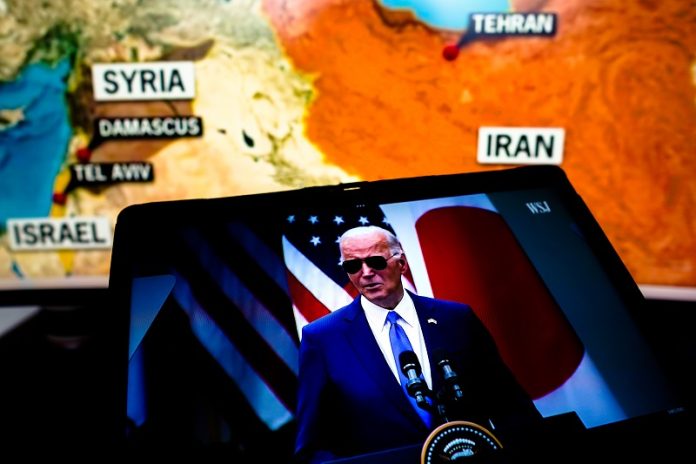
In the aftermath of the large-scale drone and missile attack launched by the Islamic Republic on Israel on April 13 and 14, there are heightened concerns about the possibility of a full-blown war between the two nations. While most of the attacks were successfully intercepted by Israel’s defense systems and by its allies, including the U.S., France, Britain, and Jordan, the incident has sparked fears of escalating tensions in the region.
The most pressing question is whether the recent development marks the demise of the Islamic Republic regime in Iran or whether it turns into a calamity, engulfing not just Iran but other regional countries. The answer to this question lies in Israel’s response.
The Israeli war cabinet has been clear that they will not let this attack go unanswered. However, three key figures in the Israeli leadership will make the final decision. These are Prime Minister Benjamin Netanyahu, Defense Minister Yoav Gallant, and Benny Gantz, the former Chief of the General Staff of the Israel Defense Forces (IDF) — who is a minister without portfolio in the current government and a member of the Israeli war cabinet.

The future of the conflict, which was started by the Islamic Republic on April 13, hinges significantly on the decisions made by these three senior officials.
On April 1, seven Islamic Revolutionary Guard Corps (IRGC) commanders were killed in Damascus — reportedly by an Israeli airstrike on a building that was registered as the Islamic Republic’s Consulate. Curiously, no diplomats were in the building during the attack.
Following the airstrike, Tehran issued warnings that it would seek to exact “great revenge” for the deaths of its IRGC commanders, signaling a potential escalation of tensions between Iran and Israel. However, in previous instances, the Islamic Republic has used such threats as part of a broader geopolitical strategy, rather as indications of immediate action.
In response to the attack on its consulate in Damascus, Iran launched several hundred suicide drones and ballistic missiles from various locations, including the western Iran, Syria, Iraq, and Lebanon. Israeli officials said that 99 percent of these incoming threats were intercepted and neutralized in the air. Subsequently, the Islamic Republic released a statement through its representative office at the United Nations, declaring that its retaliatory operation had ended.
The statement said: “In response to the armed attacks by the Israeli regime on the diplomatic facilities of the Islamic Republic of Iran in Damascus, the capital of the Syrian Arab Republic, which resulted in the deaths of seven senior Iranian military advisors, Iran confirms that late on the evening of April 13, it carried out a series of military strikes on Israeli military targets.”
“The action taken was a manifestation of the inherent right of the Islamic Republic of Iran to self-defense, as explicitly outlined in Article 51 of the United Nations Charter. It was a response to the repeated military aggressions by the Israeli regime, particularly the military attack carried out by Israel on April 1, 2024, in violation of Clause 2 of Article 4 of the UN Charter,” the statement argued.
“The UN Security Council failed to fulfill its duties in maintaining international peace and security, allowing the Israeli regime to cross red lines and violate basic principles of international law. These violations have heightened regional tensions, jeopardizing regional and international peace and security,” the statement asserted.
“The Islamic Republic would retaliate with increased force and determination in the face of any future Israeli aggression,” the statement added.
Now, the United States and Western nations are attempting to restrain Israel from taking strong actions in response to the ongoing conflict with Gaza to avoid potential escalation leading to a larger war. However, recent history shows that Israel adjusts its policies according to its interests and disregards the advice of its closest ally, the United States.
Despite verbal condemnation from regional countries regarding Israel’s attacks on Gaza, these nations have largely remained silent in the face of Iran’s attacks. Some regional countries, such as Jordan, were part of the operations to intercept and destroy Iranian missiles and drones, effectively aligning themselves with Israel’s actions.
The unsuccessful drone and missile attack conducted by the Islamic Republic had limited success, as it only caused minor damage to one of the Israeli airbases in the Negev desert and resulted in the injury of a 7-year-old girl. Despite the absence of significant physical damage, the attack had far-reaching implications on the political landscape, particularly in Israel and among Western governments. It shifted the political climate in Israel’s favor.
Prior to the attack, Netanyahu’s government was facing criticism for its handling of the conflict with Palestinians in the Gaza Strip. After the incident, there was a notable change in support for the Israeli government domestically and internationally. Western governments, which had been vocal in their criticism of the Netanyahu government’s actions against Palestinians, swiftly changed their stance.
The timing of this shift was significant. Countries such as the EU member states, the U.S., and members of the G-7 group rallied behind Israel and condemned the military actions taken by the Islamic Republic.
Meanwhile, the first voices of condemnation of the military adventure of the Islamic Republic are also being heard from inside the country.
The Independent Iranian Workers Union (IIWU), one of the most influential non-governmental organizations in the country, said in a statement: “By firing hundreds of drones and missiles towards Israel, the Islamic Republic has embarked on an adventure and started a war, which with the expansion of its depth and scope, will lead to a nation of 90 million becoming scorched earth. It seems that the rulers are carrying out their final mission to annihilate the country after 46 years of gradual destruction.”
Outside of Iran, opposition forces view the ongoing conflict as a perilous undertaking with repercussions that will ultimately burden the Iranian populace. Prince Reza Pahlavi, in his first post on “X” (formerly known as Twitter) after the attack, articulated a sentiment that underscored the interconnectedness of the fates of both Iran and Israel.
“I have been stating for years that the destinies of the people of Iran and Israel are inextricably linked. We share a collective aspiration for peace, which a common adversary, the Islamic Republic regime, has usurped. This regime poses an existential threat to both Iran and Israel, and if it remains in power, this menace will persist,” Prince Reza Pahlavi said.
While the people of Iran, inspired by our history, seek peaceful coexistence with all nations, the Islamic regime that has taken our nation hostage for 45 years seeks destructive chaos.
Ali Khamenei is trying to start a war to save his failing regime. But this is not a war that…
— Reza Pahlavi (@PahlaviReza) April 12, 2024
For years I have said the fates of Iranians and Israelis are uniquely intertwined. We have common hopes for peace, but are denied it by a common enemy: the Islamic Republic. This regime poses an existential threat to both Iran and Israel that will continue as long as this regime…
— Reza Pahlavi (@PahlaviReza) April 14, 2024
In the aftermath of the Islamic Republic’s missile and drone attack on Israel on April 14, Iran faced immediate repercussions that significantly impacted its already struggling economy. The attack heightened domestic and international concerns, leading to events that exacerbated Iran’s economic challenges.
One of the most visible effects was the sharp devaluation of the Iranian currency. The exchange rate between the U.S. dollar and the Iranian rial soared, with the dollar surpassing 700,000 rials in the Iranian market. This rapid depreciation reflected a loss of confidence in the stability of Iran’s economy following the military escalation.
At the Tehran Stock Exchange, a long queue formed as individuals rushed to sell off nearly $43 million worth of stocks. This sudden surge in selling prompted authorities to impose transaction restrictions. The measures aimed to prevent a massive outflow of funds from the market and stabilize investor sentiment amid heightened tensions.
The intention behind the missile and drone attacks conducted by the Islamic Republic of Iran against Israel was not primarily to achieve military success in the conflict. Instead, these attacks were strategically planned to enhance the prestige of the Iranian regime domestically and among its proxy forces. The aim was more to project power and influence rather than inflict significant damage on Israel.
While there were concerns both regionally and globally about Iran’s missile capabilities, the recent military actions showed that Iran’s advancements in ballistic missile production and drone technology do not pose a substantial threat to countries with advanced military defenses. The conflict highlighted a significant gap between the Islamic Republic’s claims regarding its military capabilities and the actual impact it could achieve. Iran’s inability to affect countries with superior military capabilities has shown that its assertions may not align with reality.
The drone and missile attacks on Israel have significant political implications for the Islamic Republic. In a short period of time, the ruling government in Tehran has experienced a shift in the regional political landscape that has favored Israel. The rapid transformation of the political atmosphere following the attacks has favored Israel and positioned Iran as a malevolent entity in international perceptions. This shift has impacted regional dynamics and influenced global opinions of Iran’s governance.
Any actions taken by Israel following the attacks are likely to be viewed as justifiable by a significant number of countries worldwide. There may be limited opposition to Israeli responses from the international community. Even traditional allies of Iran, such as China and Russia, are expected to exhibit restrained reactions to potential Israeli incursions into Iranian territory.
Because of these developments, the Islamic Republic finds itself more isolated. Its support comes primarily from proxy forces in nations like Iraq, Syria, Lebanon, and Yemen. However, this support may inadvertently escalate Iran’s isolation rather than bolster its position on the global stage.
OPINION: The Solution to the ‘Iran Problem’ is Regime Change
Prince Reza Pahlavi : ‘The Alternative to the Islamic Republic is the Iranian nation’

